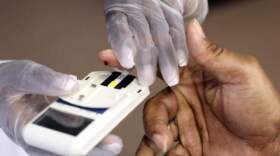-
For 50 years, a San Francisco-based group has created a space where fearful flyers can get supported exposure to air travel.
-
The Food and Drug Administration aims to evaluate treatments for rare diseases based on plausible evidence that they would work — without requiring a clinical trial first.
-
The latest wellness craze involves injecting these molecules for athletic performance, longevity and more. Scientists say the research isn't keeping pace with the health claims.
-
Families and autism experts say that the federal government could do a lot more to support autistic children by increasing access to early diagnosis and intervention.
-
Photographer Martin Roemer visited eight countries — from the U.S. to Senegal to India — to show how our identities are connected to our mode of transportation.
-
Research shows that having a sense of purpose can lower stress levels and boost our mental health. Finding meaning may not have to be an ambitious project.
-
Researchers followed more than 400,000 teens until they were adults. It found that those who used marijuana were more likely to develop serious mental illness, as well as depression and anxiety.
-
Should you trim your cuticles? How do you cut a hangnail? Is it better to use a cardboard or crystal file? Dermatologists and a nail technician share basic nail health tips.
-
South Carolina is seeing the biggest measles outbreak in the U.S. in decades, spreading mainly among unvaccinated children. At the epicenter is a story as much about politics as it is about a virus.
-
Junot Díaz's The Brief Wondrous Life of Oscar Wao was removed from an English class at the public school. PEN America says it's part of a trend of scrubbing literature dealing with uncomfortable topics.
-
At hospitals, at seminaries and on buses, the Taliban is stepping up enforcement of rules on women's dress in the city of Herat.
-
Easier than a blood test, saliva tests have the potential to detect cavities, infections and even cancer. But a lack of insurance coverage and other obstacles stand in the way of wider use.














